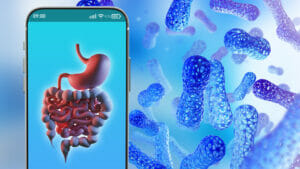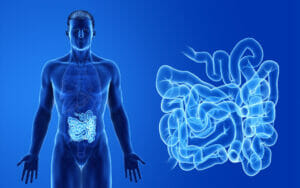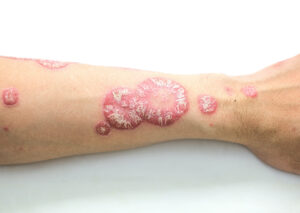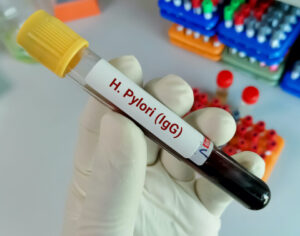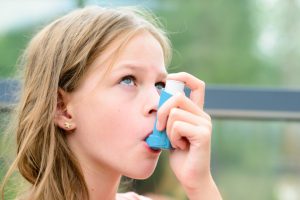Hello Everyone,
It can be challenging to flatten your tummy when you have hormonal and inflammatory conditions like Polycystic Ovary Syndrome (PCOS).
In this article, I’m going to explain why it’s hard to lose belly fat when you have PCOS and share some of my best tips for dealing with this issue.
What Is PCOS?
How to Deal With PCOS Belly Fat
Encourage Good Bacteria to Grow in Your Tummy
Move Every Day in The Right Way
Get Good Quality Sleep
Reduce Stress

What Is PCOS?
Many women have polycystic ovaries without having PCOS, but every woman with PCOS has polycystic ovaries. Let me explain… Each month, in the first half of the menstrual cycle, the ovaries develop follicles that contain eggs. One of these eggs will be released at ovulation and the remaining follicles will degenerate.
However, some women carry undeveloped follicles on the ovaries that look like bunches of grapes – these are polycystic ovaries. It is possible to have polycystic ovaries and not experience any symptoms but with PCOS, these cysts lead to hormonal imbalances and symptoms such as:
- Irregular periods or no periods
- Fertility problems
- Problems with blood sugar balance and insulin resistance
- Weight gain especially around the abdomen and belly
- Acne
- Headaches
- Excessive hair growth on the face, back, and chest (hirsutism)
- Thinning hair on the head
Tests may reveal elevated levels of luteinizing hormone and testosterone and low progesterone. There may also be problems with estrogen metabolism.
If not treated, PCOS can increase the risk of other conditions like obesity, Metabolic Syndrome, insulin resistance, Type 2 diabetes, depression, infertility, and an accumulation of fatty tissue, particularly around the tummy area.

How to Deal With PCOS Belly Fat
PCOS belly fat accumulates as a result of insulin resistance and hormonal imbalance. It can be hard to shift, but it is worth tackling because this is the sort of fat that produces inflammatory chemicals which can make your PCOS symptoms even worse.
I recommend you follow a 4-step approach to deal with PCOS belly fat;
- Support your gut microbiome.
- Do the right kind of exercise and movement.
- Get good quality sleep.
- Learn how to manage stress.
Let’s look at each of these steps in turn.

Encourage Good Bacteria to Grow in Your Tummy
Many studies show increased levels of harmful bacteria and differences in the composition of the gut microbiome in women with PCOS. These shifts in microbial balance can be related to hormone metabolism and inflammation. The wrong types of bacteria can promote inflammation and “recycle” estrogen, leading to further estrogen imbalance.
You can support the healthy balance and diversity of your gut microbiome by eating gut-healthy food like this wonderful Flax & Chia Light Banana Bread or Slow-cooker Indian Vegetable Curry.
The Eat Burn Sleep food lists and meal plans are designed to encourage the growth of beneficial gut bacteria which in turn help with hormone metabolism and lowering inflammation. We have hundreds of recipes on the platform, all designed with your gut bugs in mind!

Move Every Day in The Right Way
Core strength exercises that improve your abdominal tone are great for dealing with belly fat. They really work! You can read more about these sorts of exercises in Best Exercises to Lose Belly Fat Quickly.
Daily movement and exercise are important when you have PCOS, but it’s important to steer clear of workout plans that are too demanding and stressful. I see people doing intense workouts and not eating properly before or afterward, and this is a surefire way to worsen PCOS symptoms.
Workouts that are too intense increase your stress hormones and inflammation. They have the opposite effect of what you are trying to achieve.
The EBS membership includes access to our library of hundreds of movement videos that build muscle strength and help lower inflammation. I do these exercises myself daily, and I guarantee you will see the difference in your health.
Each routine takes half an hour or less – combine them with the food plan and you will see amazing changes, just like EBS Member Leila:
“I am on my 4th week of the 6-week reset, and I have PCOS.
Already I’ve seen amazing results and feeling much better and lighter in my body (and mind)!
Really impressed with the quality of your work and what you’ve put into this amazing platform.”

Get Good Quality Sleep
Sleep significantly affects your hormonal health and shouldn’t be underestimated. Do you sleep easily for 7-9 hours every night? If not, this is a key area to focus on if you want to be free from PCOS belly fat.
Lack of sleep affects your appetite and satiety hormones. When they are out of rhythm, you are likely to crave sugary foods and simple carbohydrates – things like sodas, pastries, candy, and other junk foods. Eating these sorts of foods when you have PCOS-related insulin resistance leads to more belly fat and more inflammation. I explore this further in What Happens If You Don’t Sleep Enough?
For insomniacs, shift workers, and people who have had a lifetime of waking up in the middle of the night we have Personalized Advice for Insomnia as part of the EBS membership. It’s a game-changer!

Reduce Stress
Stress plays a massive role in hormonal imbalance and inflammation. Stress hormones alter the balance of your gut bacteria, increase belly fat (high levels of cortisol lead to more fat storage around the belly area), and affect mental well-being. Chronic stress can lead to feelings of anxiety and depression which can make it harder to cope with PCOS.

So, please don’t despair if you have PCOS and a larger tummy than you would like because you can change it. You are not stuck with it for life.
We have many EBS members who have turned their PCOS around by following the EBS lifestyle. This is what Remi says about the program:
“After 3 years of sticking (mostly) to your food guide, I have healed my PCOS!
I just went in for hormone testing, and everything was completely normal for the first time in my life.”
We even have leading Endocrinologists who have benefited from the program, like Dr Mehreen Kahn:
“The lifestyle has helped me so much. I have PCOS and IBS/reflux. An added benefit for me is my cystic acne from PCOS just vanished. My 13-year-old acne is clearing up.
The bloat is gone, no more popping TUMS, and Gas-X and Omeprazole all the time. My tummy is flat for the first time since babies! I feel better at 40 (my birthday is tomorrow) than at 30. My hair is shinier, my nails are breaking less.”
So, are you ready to deal with PCOS belly fat? Check out our membership options now.
You might also enjoy:
Does Cortisol Cause Weight Gain?
How Much Does Inflammation Affect Weight Loss?
Yours, in health,
Yalda x
Yalda Alaoui is a qualified Naturopathic Nutritionist (with a foundation in Biomedicine) who studied with the College of Naturopathic Medicine in London. She has spent over a decade performing groundbreaking research in chronic inflammation and gut health.













